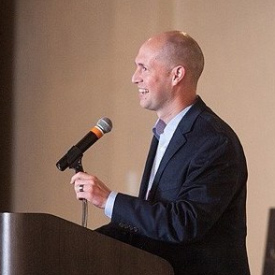5 Lessons from “The Headmaster”

Frank Boyden served as headmaster of Deerfield Academy for sixty-six years. Arriving at the school in 1902, Boyden began his labors with fourteen students and a group of trustees that were less than inspired. Shortly after arriving in town to begin his work, Boyden met one particular trustee who offered this encouraging assessment: “It’s a tossup whether the academy needs a new headmaster or an undertaker.”
Yet, despite the difficult circumstances, Boyden labored tirelessly for Deerfield, eventually building it into one of the most well-respected schools in the nation. Not surprisingly, Boyden’s story, as told in John McPhee’s The Headmaster, provides valuable insight into great leadership. Here are just five important lessons from the life and leadership of Frank Boyden.
1)Leadership takes place among people
“In his first year, he set up a card table beside a radiator just inside the front door of the school building. This was his office, not because there was no room for a headmaster’s office anywhere else but because he wanted nothing to go on in the school without his being in the middle of it. Years later, when the present main school building was built, the headmaster had the architect design a wide place in the first-floor central hallway – the spot with the heaviest traffic in the school – and that was where his desk was put and where it still is. … He has maintained his familial approach to education despite the spread of bureaucracy into institutions and industries and despite the increased size of his own school.”
2)Resist the tyranny of the urgent
“’Never make a decision just to get something done,’ he says, and no one has ever accused him of being impulsive.”
3)Refuse to favor systems over people
“Deerfield has no printed rules and no set penalties, and the headmaster has fired only five boys in sixty-four years. ‘For one foolish mistake, a boy should not have a stamp put on him that will be with him for the rest of his life,’ he says. ‘I could show you a list of rules from one school that is thirty pages long. There is no flexibility in a system like that. I’m willing to try a little longer than some of the other people do, provided there is nothing immoral. You can’t have a family of three children without having some problems, so you have problems if you have five hundred. If you make a lot of rules, they never hit the fellow you made them for. Two hours after making a rule, you may want to change it. We have rules here, unwritten ones, but we make exceptions to them more than we enforce them. I always remember what Robert E. Lee said when he was president of Washington College, which is now Washington and Lee. He said, “A boy is more important than any rule.”’”
4)In hard times, remember your calling
“’When I had been here seven years, I didn’t see many possibilities, and I began to think more and more about the law,’ he says, remembering one black period. ‘I was pretty much discouraged.’ On another of these occasions, he was about to accept a different job and leave Deerfield, but he opened his Bible, and, he says, the first passage his eye fell on was Jeremiah 42:10: ‘If ye will still abide in this land, then will I build you, and not pull you down, and I will plant you, and not pluck you up: for I repent me of the evil that I have done unto you.’ He decided to stay. He tells that story often. His wife says that she believes it is true but that he has probably condensed it by leaving out the number of times he opened the Bible before he found a passage that would satisfy him. On still another occasion when he was about to quit, a priest from South Deerfield learned about it and told him, ‘You can’t. You are the only man in the town of Deerfield who can go into every home in the valley. Now get back to work.’”
5)Learn the people around you
“He has a remarkable eye for trouble. If the mood of the student body at large is poor, he will sense it, and when one boy is disturbed, he will see it in the boy’s face, and he will think of some minor matter they need to talk over, so that he can find out what the difficulty is and try to do something about it.”

Brian Phillips
Dr. Brian Phillips serves as a pastor in Concord, NC, where he lives with his wife and their four children.










